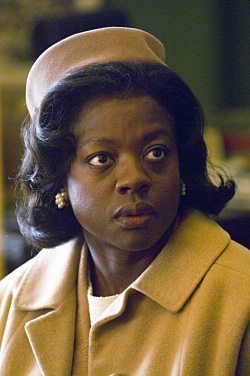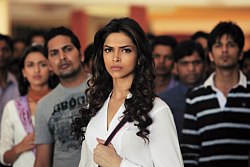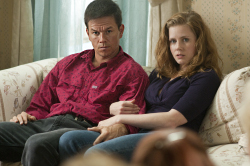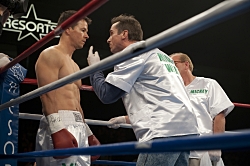Viola Davis may yet challenge Judi Dench’s record in Shakespeare in Love, when she won an Oscar for just eight minutes of screen time as Elizabeth I. In Miramax Films’ Doubt, Davis plays Mrs. Miller, the mother to a Brooklyn boy who may or may not have been subjected to inappropriate behaviour by a priest (Philip Seymour Hoffman) at his Catholic school. Sharing just two scenes with Meryl Streep, who plays the finger-pointing nun Sister Aloysius, Davis arguably makes as much impact as Dench did. Calling her turn crucial in John Patrick Shanley‘s erudite adaptation of his own Pulitzer Prize-winning play would be an understatement.
Popular on LondonNet
For Davis, 43, it marks yet another cultured performance in a career that stretches back a dozen years and encompasses some of Hollywood’s finest living directors. Among the auteurs she’s ticked off include Todd Haynes (Far From Heaven), Oliver Stone (World Trade Center) and Steven Soderbergh (who has cast her three times – in Out of Sight, Traffic and Solaris). Born in South Carolina, raised in Rhode Island and now based in Los Angeles, where she lives with her actor-husband Julius Tennon and their two children, Davis is next up in two roles that symbolise her diversity. Working alongside Russell Crowe in Kevin Macdonald’s thriller, State of Play will be followed by the broad comedy of Tyler Perry’s Madea Goes to Jail. Below, she talks about why Doubt is one of the most “fabulous” roles of her career, why she wants more and why we need a black Lindsay Lohan.
More Doubt Interviews:
– John Patrick Shanley
– Philip Seymour Hoffman
– Meryl Streep
– Amy Adams
What attracted you to the role in Doubt?
The fact that it was good stuff. I don’t get a lot of great, fabulous roles like this that come along, that are fully realised, and humanised, and complicated, with a lot of duality and contradictions, written for a black woman. And with Meryl Streep, Philip Seymour Hoffman and Amy Adams – that pedigree…that’s what attracted me to the role.
Were you nervous about working with Streep?
Absolutely. It was terrifying. Did I say terrifying? Terrifying! But she’s perfection. When you’re trying to find a scene as an actor, you have to suck. You have to allow yourself to suck. You have to allow yourself to make mistakes and be in a place that you don’t know where you’re completely confused. To be completely confused and to suck, even in a rehearsal period, with Meryl Streep watching, is a behind-tightening experience. But not really. You put that on yourself because you’re putting that on her. Her reputation precedes her, as they say. You put that icon status on her. Like, ‘You can’t make a mistake around Meryl. She’s going to be perfect.’ So I’m putting all that stuff on her, before I even get into rehearsal. So for a second, it made me tight – until you realise she’s an actor. It’s like anything else, isn’t it? It’s like any other job. I have to tell you. Because she’s Meryl Streep, it made it easier, because she’s so talented and so giving. She does something that a lot of actors don’t understand that is a part of your work – she listens. She listens. That’s as much a part of acting as the emoting.
What did you and Meryl talked about in between takes on your scenes?
We talked about really important things. We talked about cooking! I really thought about it too – I was thinking, ‘I’m with Meryl Streep. I could ask her about Sophie’s Choice and Out of Africa and A Cry in the Dark. I could tell her I love her! And we’re talking about cooking!’ At one point, she said, ‘How are your feet by the way? Do you have good feet?’ I said, ‘My feet are pretty good. How are your feet?’ And she said, ‘Oh, my feet are terrible. Do you want some chocolate?’ And I said, ‘Yeah, I want some chocolate.’ That was our conversation. I think it’s because…you know what happens when you’re shooting a scene, after you’ve rehearsed and you’ve done all this? I’m almost afraid to admit this, but the natural rapport of what your characters are going through extends into real life. And with our characters…there’s nothing to talk about. It’s kind of tense and we were a little tense with each other. But also, I kind of like her. My character thinks Sister Aloysius is a bit of a bulldog, but we would have a casual relationship if it weren’t for this confrontation. So I think it naturally happened that we talked about feet and cooking!
Did you spend much time with Joseph Foster, who plays your character’s son Donald?
No! I feel like a bad actor now! That’s the thing when you’re doing the film, you don’t get to see the actor a whole lot. I saw him during rehearsals, so I interacted with him then. I felt like I had to kiss him a lot for some reason. At one point, I wanted him to sit in my lap – and he was horrified by that. He’s not really that age. He’s a really sweet kid, by the way. Actually, he was talking about cooking too! So I did as much as I could when I saw him. I have to tell you – I’m on the periphery of everything that’s going on in this movie. I’m the outsider.
Did you have much rehearsal time?
Yes, three weeks. It was so great. By the time we got to the set, you really felt prepared. The emphasis so much is on character and words. So often the emphasis in movies is on the visual or hitting a mark. Now, we have words and characters and you have to be able to sustain it.
So did you and the other cast members sit about debating whether Father Flynn is guilty or not?
We didn’t have any discussions. We were too busy working on these characters. For me, anyway, the question was not whether he did it or not. The question was belief systems and the rigidity of what we believe and what we think is absolutely certain. It can be death. Change happens when doubt happens and you can admit it. Now, that may not be comfortable but there’s growth in that. The themes are much more encompassing and grander than whether he did it or not.
How was working with John?
Oh, it was fantastic. I appreciated the fact that he trusted us with the material. He gave us a wide berth to discover and to explore, and it was also an atmosphere of trust. And I trusted him to stop me if he saw that I was going in the wrong direction. I respected the fact that he gave me that wide berth to do what I do.
Did you spend much time on the set when you weren’t in the scenes?
I did, because I had to test my hair. I would sneak up because I wanted to stare at Meryl Streep. I love Philip and Amy too, but I really wanted to stare at Meryl also. I would sneak upstairs and see her work. And also because you feel like you’re on the periphery and you’re waiting around to do your scene, you’re so excited and ancy, you want to see how it’s going. In the theatre, you’re there all the time, for everybody’s scenes. But in the movies, you feel so removed. It’s like how I feel with my husband – like ‘I don’t want you going to a party without me because I don’t want you having fun without me.’ I felt that way about Amy, Philip and Meryl – I don’t want you guys having fun without me!
There is a lot of Oscar buzz around your performance. Are you ready for all that?
No – I’m not prepared for it. I’m barely prepared for this. Really! They say, ‘We’re going to get you a suite at the Four Seasons. We’re going to get someone to put a dress on you, make-up and hair…’ And I’m not even remotely having all this buzz! This buzz started happening before people had seen the movie! I’m not even used to that! And what’s buzz? Seriously! You can’t cash a cheque on buzz, you can’t pay your mortgage on buzz, you can’t touch buzz, buzz is buzz … it’s buzzing! And it doesn’t have to materialise. So to be honest, when they start saying you might get an Academy Award nomination, you might even call your mom – and say, ‘Mom, they think I might get an Academy Award nomination!’ And she’s like, ‘Oh, girl. That’s so good. Viola! Viola! That’s so good.’ Then you hang up the phone and go, ‘I don’t even have a job!’ And that’s the thing that knocks you on your behind and humbles you. It is what it is. The only thing I have right now is that I can tell you about the process and the work. I can get all dolled up and be in the Four Seasons, because it’s happening and I can touch it. But buzz makes me nervous.
You’ve worked with Oliver Stone, Todd Haynes, Steven Soderbergh…
Oh, yeah, absolutely. It’s been a joy. I have a pretty great career as an actress, but I always want more! It’s an occupational hazard. Once you start to work, the more you want to work. You want the roles to get better and better. Because it’s when the roles get better and better that you get better.
So Doubt has given you a thirst for bigger and better roles?
Absolutely – and it’s a complicated character. Even if it’s a small role, it’s a fabulous role. This is what would be considered a fabulous role. There is so much contradiction and duality, and she’s not who she appears to be, so there’s so much to play, so much to bite in to. Yeah, once you have a great role, you want it to keep coming. You expect it. Everything is compared to that. But of course I’ve been acting for so long; I know it can’t always be like that.
Is it hard to keep grounded?
I’m trying to keep myself grounded. This is my life, OK? I want to be able to enjoy the moment, and the only way you can enjoy the moment is when you release expectations and you can live in it. Otherwise, you’re always ahead of it and not in it. They say that in acting too – you never get ahead of yourself but always stay in the moment. You don’t know what’s going to happen next. Well, I’m trying to do the same thing in my life and not get ahead of it.
What was your own schooling? Was it very religious?
Oh, gosh, no. I never went to Catholic school. I went to public school. But I wanted to be a Catholic so bad! I swear to God! I think there’s something sick and twisted about me, but I listened to Meryl and John, and he talked about Catholicism, and it still sounds so attractive to me! The rituals of it. When I was growing up in Central Falls, I didn’t grow up with any religious background whatsoever. But everybody around me was Catholic. I grew up in an extremely Catholic community, and for me it was such a sense of community, such a sense of belonging, such a sense of family and tradition, and I wanted to be a part of that, because I felt like I was on the periphery.
Did you nag your parents about becoming a Catholic then?
I would’ve but it wasn’t even an option for my parents! They grew up Baptist in South Carolina. Then we moved to Rhode Island, where there were no Baptist churches. Just Catholic churches. And so I never even went to church. There was nothing. And I understand the rigidity of Catholicism, but then I was on the other side of it, of having nothing to fight against. No kind of tradition to fight against – and I wanted that so bad.
Do you go to church now?
Oh, yes, I go to church now. But when I grew up, not at all.
How did you get to become an actress then?
I trained at drama school. I went to drama school when I was 15 in Massachusetts. It was a young people’s school for performing arts. I majored in theatre at Rhode Island College. I went to Julliard in New York. I imagined in my fantasy that every actor took that path, once they fell in love with the profession. I fell in love with being an actor and I fell in love with going to acting school. I thought, ‘That was the path that you have to take.’ Now it’s become a dirty word, to go to acting school, to have a craft. You have to fly by the seat of your pants, be cute and young – everything but trained. A lot of times people don’t care. People will hook onto something you’ve done because they think you’re cute. People don’t have an aesthetic, an appreciation of the art form and knowledge of it. They just really want to be entertained.
You’re coming up in State of Play. What do you do in that?
I play a pathologist, named Dr. Joy Jackson. I did a day of work. It was fabulous. I worked with Russell Crowe. I was treated great – but it was just a day!
Was Russell Crowe intimidating?
Yeah, he is! I just saw him in this scene – and he seems to be a very unorthodox journalist, not a play-by-the-book journalist, which I like.
Anything else coming up?
I have Madea Goes to Jail, a Tyler Perry movie that I did. I had a lot of fun with it and I did it because I got a lot of street cred for doing a Tyler Perry movie. My nieces and nephews thought I was so cool! And I like being cool for them!
You’re also married to an actor. Does that help when dealing with the business?
Yes. The fact that he’s an actor makes it fantastic. But also, it’s the kind of person you marry. The temperament. Like when you marry someone, you’ve got to choose well. That’s how it starts. I married a man who has lived a life, so he’s more than just what he does. He’s a man of strong character. The fact he understands it’s very difficult to get with someone who’s outside the business who understands it. It’s very difficult. The paranoia, the unemployment, the whole instability, the hours…all of it. Even this, what we’re doing, the publicity…it’s unorthodox. It’s a rogue profession. Most people who live in the real world don’t separate for long periods of time. I’ve done a play for six months. I’ve done a movie for three months. People don’t do that. I remember, friends of ours said, ‘We could never be separated for three weeks’ and I thought, ‘Three weeks? That’s not even that long.’
You sound like you’re very even tempered?
Maybe because it didn’t come easy for me and maybe because I’m not a princess…I’ve never been a princess. I feel more like a princess during this publicity tour than I ever have in my life! It’s very surreal for me. And I’m trying to enjoy it.








